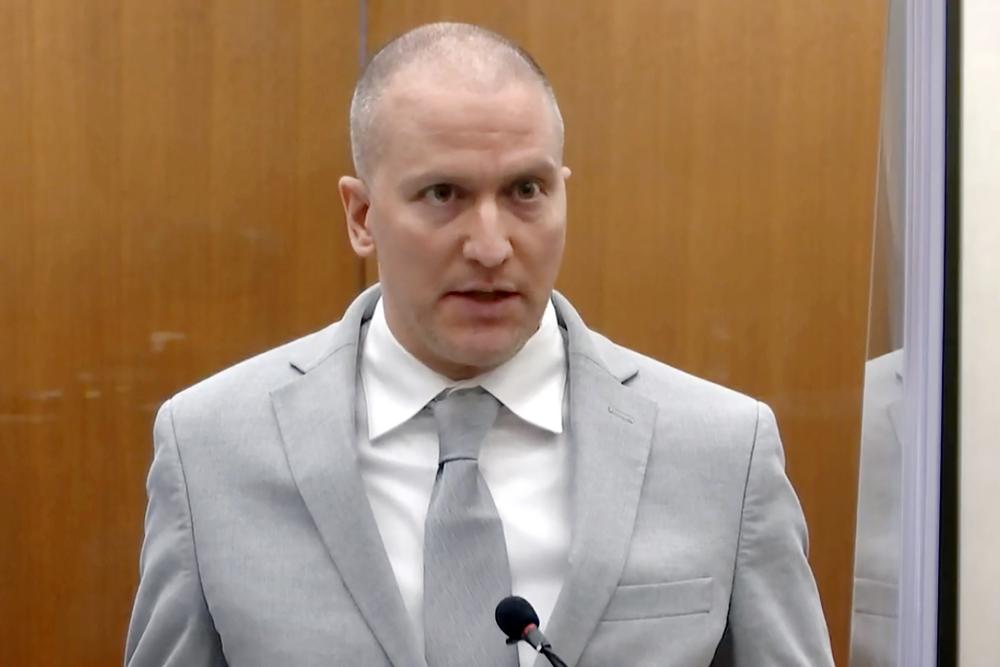FILE – Former Minneapolis police Officer Derek Chauvin addresses the court as Hennepin County Judge Peter Cahill presides over Chauvin’s sentencing at the Hennepin County Courthouse in Minneapolis June 25, 2021. Chauvin appears to be on the verge of pleading guilty to violating George Floyd’s civil rights. A federal docket entry on Monday, Dec. 13, 2021 showed that a hearing has been scheduled for Wednesday for Chauvin to change his current not-guilty plea in the case. The court system also sent out instructions for media to attend the hearing. (Court TV via AP, Pool, File)
ST. PAUL, Minn. (AP) — Former Minneapolis police Officer Derek Chauvin appeared in federal court in person Wednesday morning for a change of plea hearing during which he was expected to admit to violating George Floyd’s civil rights.
Although the scheduling of the change of plea hearing suggests a guilty plea is imminent, details have not been made public and nothing will be official until Chauvin enters his plea in court and the agreement is accepted by a judge.
Chauvin was in the courtroom Wednesday ahead of the hearing and was wearing an orange short-sleeved prison shirt.
Chauvin, who is white, is charged with two counts of depriving Floyd of his rights for pinning his knee against Floyd’s neck as the Black man said he couldn’t breathe and for failing to provide medical care to Floyd during a May 25, 2020, arrest that resulted in Floyd’s death. Chauvin has already been convicted of state murder and manslaughter charges and is serving a sentence of 22 1/2 years.
A guilty plea is likely to extend Chauvin’s time behind bars.
In Minnesota, defendants with good behavior serve two-thirds of their sentence in prison, and the remaining one-third on supervised release, also known as parole. Under that formula, he’s expected to serve 15 years in prison on the state charges, and 7 1/2 years on parole.
Under sentencing guidelines, Chauvin could get a federal penalty ranging from 27 years to more than 33 years in prison, with credit for taking responsibility, said Mark Osler, a professor at the University of St. Thomas School of Law. But the guidelines are not mandatory, and Osler estimated Chauvin would be sentenced toward the lower end of the range.
He faces two more counts in a separate case involving the restraint of a Black teenager in 2017. Prosecutors filed a document Wednesday combining the 2017 case with the Floyd case, suggesting Chauvin was ready to plead guilty in that case as well.
Floyd’s arrest and death, which a bystander captured on cellphone video, sparked mass protests nationwide that called for an end to racial inequality and police mistreatment of Black people.
Chauvin and three other former officers — Thomas Lane, J. Kueng and Tou Thao — were indicted earlier this year on federal charges alleging they willfully violated Floyd’s rights. A federal trial for the other three men still appears to be scheduled for January.
To bring federal charges in deaths involving police, prosecutors must believe an officer acted under the “color of law,” or government authority, and willfully deprived someone of their constitutional rights. That’s a high legal standard. An accident, bad judgment or simple negligence on the officer’s part isn’t enough to support federal charges. Prosecutors have to prove the officer knew what he was doing was wrong in that moment but did it anyway.
According to evidence in the state case against Chauvin, Kueng and Lane helped restrain the 46-year-old Floyd as he was on the ground — Kueng knelt on Floyd’s back and Lane held down Floyd’s legs. Thao held back bystanders and kept them from intervening during the 9 1/2-minute restraint.
All four former officers were charged broadly in federal court with depriving Floyd of his rights while acting under government authority, but the federal indictment broke down the counts even further. The first count against Chauvin alleges he violated Floyd’s right to be free from unreasonable seizure and unreasonable force by a police officer when he kept his knee on Floyd’s neck, even after Floyd was unresponsive.
The second count alleges Chauvin willfully deprived Floyd of liberty without due process, including the right to be free from “deliberate indifference to his serious medical needs.”
In the 2017 case involving the then-14-year-old boy, Chauvin is charged with depriving the boy, who was handcuffed and not resisting, of his right to be free of unreasonable force when he held him by the throat, hit him in the head with a flashlight and held his knee on the boy’s neck and upper back while he was in a prone position.
According to a police report from that 2017 encounter, Chauvin wrote that the teen resisted arrest and after the teen, whom he described as 6-foot-2 and about 240 pounds, was handcuffed, Chauvin “used body weight to pin” him to the floor. The boy was bleeding from the ear and needed two stitches.
That encounter was one of several mentioned in state court filings that prosecutors said showed Chauvin had used neck or head and upper body restraints seven times before dating back to 2014, including four times state prosecutors said he went too far and held the restraints “beyond the point when such force was needed under the circumstances.”
The other three former officers are still expected to go to trial on federal charges in January, and they face state trial on aiding and abetting counts in March.
Floyd’s arrest and death, which a bystander captured on cellphone video, sparked mass protests nationwide that called for an end to racial inequality and police mistreatment of Black people.
Chauvin and three other former officers — Thomas Lane, J. Kueng and Tou Thao — were indicted earlier this year on federal charges alleging they willfully violated Floyd’s rights. A federal trial for the other three men still appears to be scheduled for January.
To bring federal charges in deaths involving police, prosecutors must believe an officer acted under the “color of law,” or government authority, and willfully deprived someone of their constitutional rights. That’s a high legal standard. An accident, bad judgment or simple negligence on the officer’s part isn’t enough to support federal charges. Prosecutors have to prove the officer knew what he was doing was wrong in that moment but did it anyway.
According to evidence in the state case against Chauvin, Kueng and Lane helped restrain the 46-year-old Floyd as he was on the ground — Kueng knelt on Floyd’s back and Lane held down Floyd’s legs. Thao held back bystanders and kept them from intervening during the 9 1/2-minute restraint.
All four former officers were charged broadly in federal court with depriving Floyd of his rights while acting under government authority, but the federal indictment broke down the counts even further. The first count against Chauvin alleges he violated Floyd’s right to be free from unreasonable seizure and unreasonable force by a police officer when he kept his knee on Floyd’s neck, even after Floyd was unresponsive.
The second count alleges Chauvin willfully deprived Floyd of liberty without due process, including the right to be free from “deliberate indifference to his serious medical needs.”
In the 2017 case involving the then-14-year-old boy, Chauvin is charged with depriving the boy, who was handcuffed and not resisting, of his right to be free of unreasonable force when he held him by the throat, hit him in the head with a flashlight and held his knee on the boy’s neck and upper back while he was in a prone position.
According to a police report from that 2017 encounter, Chauvin wrote that the teen resisted arrest and after the teen, whom he described as 6-foot-2 and about 240 pounds, was handcuffed, Chauvin “used body weight to pin” him to the floor. The boy was bleeding from the ear and needed two stitches.
That encounter was one of several mentioned in state court filings that prosecutors said showed Chauvin had used neck or head and upper body restraints seven times before dating back to 2014, including four times state prosecutors said he went too far and held the restraints “beyond the point when such force was needed under the circumstances.”
The other three former officers are still expected to go to trial on federal charges in January, and they face state trial on aiding and abetting counts in March.
Copyright 2021 Associated Press. All rights reserved.


